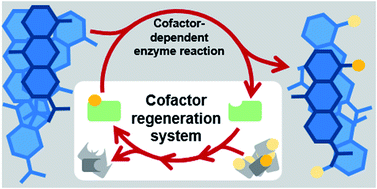Round, round we go – strategies for enzymatic cofactor regeneration
Abstract
Covering: up to the beginning of 2020
Enzymes depending on cofactors are essential in many biosynthetic pathways of natural products. They are often involved in key steps: catalytic conversions that are difficult to achieve purely with synthetic organic chemistry. Hence, cofactor-dependent enzymes have great potential for biocatalysis, on the condition that a corresponding cofactor regeneration system is available. For some cofactors, these regeneration systems require multiple steps; such complex enzyme cascades/multi-enzyme systems are (still) challenging for in vitro biocatalysis. Further, artificial cofactor analogues have been synthesised that are more stable, show an altered reaction range, or act as inhibitors. The development of bio-orthogonal systems that can be used for the production of modified natural products in vivo is an ongoing challenge. In light of the recent progress in this field, this review aims to provide an overview of general strategies involving enzyme cofactors, cofactor analogues, and regeneration systems; highlighting the current possibilities for application of enzymes using some of the most common cofactors.

- This article is part of the themed collection: Enzymes in natural product total synthesis


 Please wait while we load your content...
Please wait while we load your content...